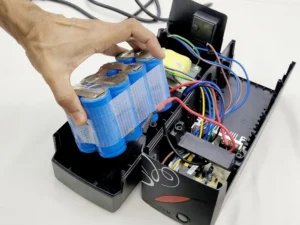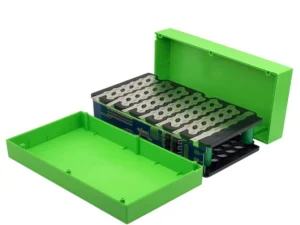Introduction:
Lithium Iron Phosphate, or LiFePO4, is a type of lithium-ion battery that has gained significant attention. Its popularity has increased in recent years due to its remarkable characteristics. It has wide applications across various industries.
LiFePO4 batteries are considered advancement in battery technology. They offer improved safety, longer lifespan, high energy density, and enhanced environmental sustainability. In this article we will further delve into what is a LiFePO4 battery and how can it be a game changer in the near future.
Understanding LiFePO4 Chemistry
Before answering the question what are lifepo4 batteries and their applications, you need to remeber LiFePO4 batteries are named after their chemical composition. The key components of a LiFePO4 battery are lithium (Li), iron (Fe), and phosphate (PO4). The lithium ions move between the anode (typically made of carbon) and the cathode (made of LiFePO4).
The lithium iron phosphate structure provides stability, safety, and a flat voltage discharge. This makes it an ideal choice for various applications where a consistent power supply is crucial.
Advantages of LiFePO4 Batteries

-
Enhanced Safety
LiFePO4 batteries are renowned for their superior thermal and chemical stability. They have a higher thermal runaway temperature compared to other lithium-ion batteries. This reduces the risk of thermal incidents, making them safer for use in demanding conditions.
-
Longer Lifespan
LiFePO4 batteries have an exceptional cycle life. They have the ability to withstand thousands of charge and discharge cycles. That too without significant capacity loss. This longevity makes them a preferred choice. Especially, in applications where long-term reliability is essential. For example, solar energy storage and electric vehicles.
-
High Energy Density
LiFePO4 batteries offer a high energy density. They also provide a substantial amount of energy in a compact and lightweight package. This characteristic makes them ideal for portable electronic devices and electric vehicles. This is where their high energy-to-weight ratio comes into the picture.
-
Environmentally Friendly
The materials used in LiFePO4 lithium batteries are more environmentally friendly. They are also abundant compared to other lithium-ion chemistries. For example, the phosphate component is abundant and less harmful to the environment. This is untrue in the case of cobalt used in some other lithium-ion batteries.
-
Fast Charging
LiFePO4 batteries can be charged at higher currents without compromising safety or performance. They have relatively low internal resistance. This allows for rapid charging, which is advantageous in various applications.
-
Stable Discharge Voltage
LiFePO4 batteries maintain a stable discharge voltage for the majority of their discharge cycle. This characteristic allows for predictable and consistent power delivery. This is crucial for applications like electric vehicles.
Applications of LiFePO4 Batteries
LiFePO4 batteries find applications in a wide range of industries:
1. Electric Vehicles (EVs)
LiFePO4 batteries are gaining popularity in electric vehicles due to their high energy density. They also have longer cycle life and safety features. Additionally, they contribute to the advancement of sustainable transportation.
2. Renewable Energy Storage
LiFePO4 batteries are utilized for storing solar and wind energy. They provide a reliable and consistent power supply. They can do this even when renewable sources are unavailable or inconsistent.
3. Marine and RV Applications
LiFePO4 batteries are a preferred choice for marine and RV applications. This is due to their durability, energy efficiency, and longer lifespan. They can act as a reliable power source for extended periods.
4. Telecommunications:
LiFePO4 batteries are used in backup power systems for telecommunication infrastructure. They provide a dependable and stable power source during outages.
5. Portable Electronics
LiFePO4 batteries power a variety of portable electronic devices. Laptops, smartphones, and power banks are some of them. This is due to their high energy density and fast charging capabilities.
LiFePO4 Battery Chargers
LiFePO4 battery chargers are specialized devices designed to efficiently charge LiFePO4 batteries. They utilize the specific LiFePO4 battery charging requirements of lithium-iron phosphate cells. These chargers typically employ a multi-stage charging process to optimize the charging efficiency. That is how they extend the battery’s lifespan.
The charging process involves stages like bulk charging, absorption, and a maintenance or float stage. This is to ensure the battery reaches its full capacity without overcharging. LiFePO4 batteries consist of individual LiFePO4 battery cells, each containing a cathode, an anode, and a separator. The charging process involves the movement of lithium ions between these cells.
Types of LiFePO4 Batteries

LiFePO4 batteries are available in various voltages. This is to cater to different applications and power requirements. The 12V LiFePO4 battery is a common choice for small-scale applications. Examples include RVs, boats, and off-grid systems (providing a reliable power source).
The 24V is the cheap and best LiFePO4 battery configuration and is often used in medium-sized applications. They offer increased energy storage capacity and suitability. They are meant for larger vehicles or renewable energy systems.
For larger and more demanding applications, the 48V LiFePO4 battery is preferred. Examples include electric vehicles (EVs) and industrial energy storage solutions. They provide high energy density and efficient power delivery. Each of these voltage configurations comes with its own advantages. It makes LiFePO4 batteries versatile and adaptable to a wide range of power needs.
LiFePO4 Battery: Frequently Asked Questions
1. What are the advantages of LiFePO4 batteries over other types of batteries?
LiFePO4 batteries offer several advantages, including enhanced safety. This is due to higher thermal stability, and a longer lifespan with thousands of charge-discharge cycles. They also have a high energy density and environmental friendliness with a stable discharge voltage.
2. What is the lifespan of a LiFePO4 battery?
LiFePO4 batteries are known for their long lifespan. They can endure thousands of charge-discharge cycles. Typically, they can last upwards of 2,000 to 7,000 cycles, depending on usage conditions and depth of discharge.
3. Can LiFePO4 batteries be charged quickly?
Yes, LiFePO4 batteries have low internal resistance, allowing for rapid charging. They can be charged at higher currents without compromising safety or performance.
4. Can LiFePO4 batteries be recycled?
Yes, LiFePO4 batteries are recyclable. The materials used, including lithium, iron, and phosphate, can be extracted and reused. They can be used to manufacture new batteries or other products.
5. Are LiFePO4 batteries suitable for off-grid energy storage?
Yes, LiFePO4 batteries are excellent for off-grid energy storage, particularly in renewable energy systems. They can store excess energy from solar panels or wind turbines, providing reliable power during periods of low or no natural resource availability.
Conclusion:
In conclusion, LiFePO4 batteries have revolutionized the energy storage landscape. They come with exceptional safety, long lifespan, high energy density, and environmental sustainability. As technology continues to evolve, LiFePO4 batteries are expected to evolve. They can play a significant role in a wide range of energy-efficient applications in the future. Hope the above mentioned information has answered the question what is a LiFePO4 battery comprehensively.
